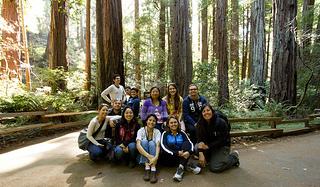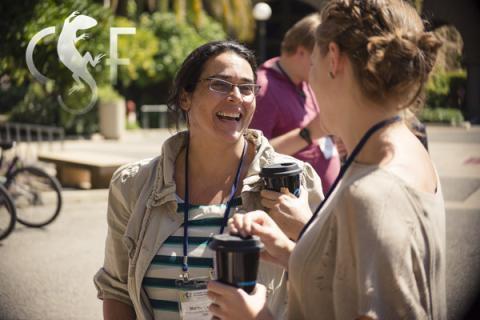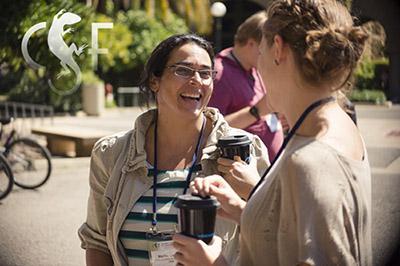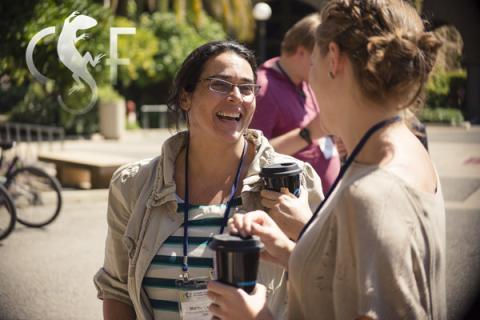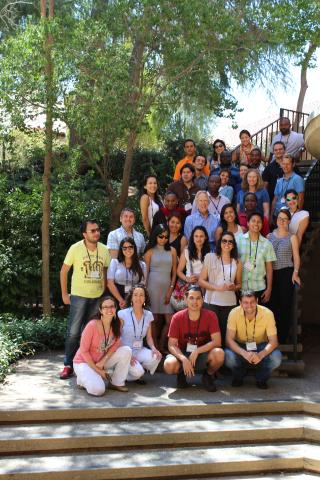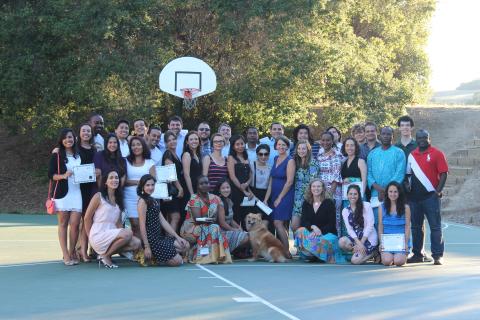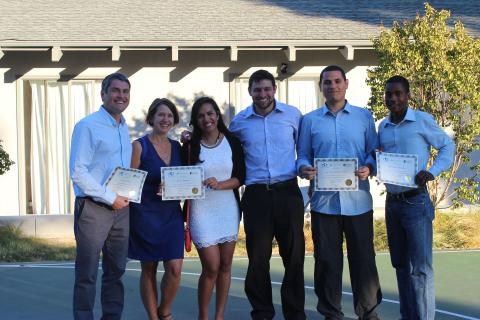
USA
“I gained a deeper understanding of microeconomic principles and why they can help conservationists and development practitioners. I met wonderful people that share similar values and will be a great resource for my work and inspiration for some time to come.” –Ulrike Troeger, Germany, 2014 International Course Participant
Thirty participants representing 16 countries and 25 different organizations attended CSF's 16th annual Economic Tools for Conservation course held at Stanford University. During the two-week training, instructors from CSF, Oregon State University, the University of Brasília, and Cambridge Resources International led an intensive schedule of lectures, exercises, and games to help participants gain an understanding of our core curriculum. Topics included Microeconomics, Natural Resource Economics, Environmental Policy and Valuation, and Cost-Benefit Analysis. Lively guest speakers, a beautiful field trip, and adventures to San Francisco rounded out the expereince. Many thanks to our partners at the Stanford Woods Institite for the Environment and the Center for Conservation Biology for working with us to put on an excellent training!
“I am better prepared to argue about the costs and benefits of environmental and development projects. I understand how to use economic tools am better able to review documents and projects that use economic arguments. I can now differentiate when to use which method or tool, and I can identify experts that can help my project and better understand the quality of their work.” –Percy Summers, Peru, 2014 International Course Participant
ORIGINAL COURSE ANNOUNCEMENT
Conservation Strategy Fund is offering its 16th annual international training course, Economic Tools for Conservation, August 11-22, 2014 located at Stanford University. This course is being offered in partnership with the Stanford Woods Institute for the Environment and the Center for Conservation Biology at Stanford.
Over the last decade, this course has become recognized as the premier applied economics training event for conservation professionals from around the world.
Click here to view the Information for Participants Page
During the comprehensive two-week session, participants will learn to use economics to be more strategic and successful in their conservation work, and experience a transformational shift in how they view environmental issues. The course covers economic fundamentals, natural resource and environmental economics, communication and negotiation techniques, and hands-on experience with cost-benefit analysis. These skills are crucial at a time when global-scale environmental changes are being driven by a diversity of economic factors, and when conservation leaders are striving to harness opportunities to reward the preservation of ecosystem services.
"I truly believe that I have received one, if not the best piece of schooling since my University days in the UK. Perhaps my way of appreciating the excellent multi-cultural training we received is to use it, and sure like rain we are using it!" –Peter Mbile, Cameroon
BENEFITS
Participants gain:
• An essential foundation in basic economic concepts and language.
• Insight into the drivers of environmental problems.
• The ability to formulate more effective solutions and policies for conservation.
• Skills to evaluate the costs and benefits of natural resource management and development decisions, and the ability to identify the best opportunities to apply economics to conservation.
• Invaluable practice using communication and negotiation techniques to articulate environmental values in a language that communities, businesses, and governments can understand.
• A close network with fellow conservation professionals through the unique CSF Residence Program on the Stanford campus.COST
The total cost for the two-week course is $4000 per participant. This fee covers the following:
• Instruction by renowned economic experts
• All course materials and supplies
• Exclusive access to CSF online intranet with course reading and materials
• 13 nights lodging in CSF Course House on Stanford University campus
• All meals and coffee breaks during course
• Access to Stanford’s renowned athletic facilities
• Laundry facilities
• Staff-led tours of Stanford campus, including campus highlights and nature walks
• Field trip to Stanford Jasper Ridge Biological Preserve
• Assistance planning day-off activities in San Francisco and surrounding area
• Travel health insurance, if not provided by employer
• Transportation from Stanford University to the San Francisco Airport upon departure
• Lifetime membership in CSF’s global alumni network Accepted applicants are responsible for seeking their own funding from employers, government, sponsors or other funding sources to cover their course fees and travel expenses.
PARTICIPANTS
This course is for people at the forefront of conservation challenges, including managers of conservation programs and protected areas, directors of non-governmental organizations, and representatives of government agencies. Applicants from a variety of disciplines such as biology, forestry, law, anthropology, or economics are encouraged to apply. Previous training in economics is beneficial, but not essential. Applicants must be proficient in spoken and written English.
COURSE IMPACT
Year after year, participants give CSF’s Economic Tools for Conservation course highest marks in terms of content, instructors, staff and the overall course experience. Our courses also create significant and lasting impacts. Alumni report that
• The course influenced how I approach my conservation work – 95%
• The training was one of the most useful short courses I have attended – 92%
• I continue to benefit from my CSF training – 90%
"I expected to gain new skills in economic analysis and feel that I got much more than that; it was more like a fundamental paradigm shift in the way I examine environmental issues." –Leah Wahlberg, Canada
POISED FOR SUCCESS
The majority of our graduates report that their CSF Training has helped them achieve a specific conservation or sustainable development success. Here is what some of our alumni say about how how CSF's training has transformed their work and led to real conservation impact:
"When talking to local government in the Amazon, you can only make the case for conservation areas by talking about monetary values and that’s exactly what the CSF course taught me to do. It enabled me to present a more sophisticated version of my ’romantic‘ arguments about the importance of parks and reserves." –Clarice Bassi, Brazil
"The course helped me to carry out a survey on the bushmeat trade and consumption in Eastern DR Congo. Results were used by the Congolese Wildlife Authority to implement an antipoaching program." –Chifundera Kusamba, DRC
PROGRAM
Microeconomics
• Market theory: Supply, demand, market equilibrium, and competition.
• Externalities, market failures and public goods: Why markets are inefficient when it comes to environmental protection. Natural Resource Economics
• Capital theory: The time value of money, interest rates and how they influence the use of natural resources.
• Renewable resource extraction: Forest economics, optimal harvesting and policy options.
• Exercises and instruction focused on forest policy negotiation skills. Environmental Policy
• An overview of various environmental policies to correct the problems of externalities, public goods and market failures, and the role of property rights.
• An overview of the role of environmental policies such as command and control legislation versus economic instruments for conservation such as taxes, subsidies, and tradable permit systems.
Environmental Valuation
• Environmental values, the methods used to calculate them, and how these methods are best used in various countries.
Cost-Benefit Analysis
• Case studies evaluating the economic feasibility of small-scale and large-scale projects, including incorporation of externalities and sensitivity analysis.
Forests, Carbon, REDD+
• Introduction to the concepts and opportunities of forest carbon and carbon markets, with an emphasis on emissions reduction schemes, avoided deforestation, and opportunity costs of conservation.
Communication
• Effective strategies for presenting economic analysis results.
INSTRUCTORS
Economic Tools for Ecosystem Conservation is taught by experts in environmental economics who also have extensive field experience and understand real-world conservation challenges. They are drawn from CSF staff as well as several leading academic and international institutions such as Stanford University, Harvard University, University of São Paulo, the World Bank, and Duke University. Links to individual instructor profiles are provided at the bottom of this page.LOCATION
The course is held on the Stanford University campus in Stanford, California. Situated in the heart of Silicon Valley, Stanford is 25 miles from San Francisco and close to downtown Palo Alto. The beautiful 8,000-acre campus is surrounded by rolling oak woodlands and provides numerous opportunities for outdoor recreation. Participants enjoy a unique residential experience in the CSF House on the Stanford University Campus. During the two-week course, the House transforms into a collaborative conservation community with participants connecting, sharing ideas, and creating networks that will last a lifetime. The House provides shared occupancy rooms, single-sex bathrooms on each floor, and our own kitchen and common spaces. CSF staff will facilitate evening programs to work on course exercises and case studies, lead walks and campus art tours, and help participants give presentations about their work and home countries. The CSF House is walking distance to classes and campus attractions such as the Stanford Bookstore, Coffee House, athletic facilities, museums and sculpture gardens. During the course, participants will have the opportunity to visit Stanford’s Jasper Ridge Biological Preserve, located near Stanford University's campus in the eastern foothills of the Santa Cruz Mountains. The Preserve, which is not open to the public, encompasses remarkable geologic, topographic, and biological diversity within its almost 500 hectares, and provides a natural laboratory for researchers from all over the world, educational experiences to students and docent-led visitors, and refuge to native plants and animals. The Preserve's 9,800 square foot Sun Field station is a research and education facility that houses a research laboratory, two classrooms, a reference library, a herbarium, and staff offices, and has received awards for sustainable and energy efficient design.
ADDITIONAL INFORMATION
Participants should also budget for the following expenses:
• International and national travel to and from Stanford University.
• U.S. visa fees - usually around $140. Please apply for a B1 business visa, as our short training course is considered as a professional conference or workshop.
• Airport transportation to Stanford - about $35 from the San Francisco airport.
• Accommodation prior to Saturday, August 9th or after Saturday, August 23rd. We can provide suggestions for any early arrivals or late stays outside of these dates.
• Transportation and lunch during day off - approximately $50.
• Other incidentals - $100.
"The course gave me a broad vision of the tools of economics. We received enough knowledge to understand all the valuation and cost benefit analysis done in the 'real' world. I got all that I expected and much, much more! Coming to the CSF Course and mingling with the community and my colleagues was such a pleasant and motivating experience I can't find a way to thank you all!"

